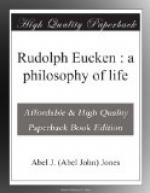But before we proceed to deal with Eucken’s contribution to the problem, it will be profitable to stay awhile to consider how it is that we can obtain truth at all, and what are the tests that we can apply to truth when we think we have attained it. It is the problem of the possibility of knowledge, really, that we have to discuss in brief. Eucken himself does not pay much direct attention to this difficult question, for, as has been already pointed out, he refuses to be drawn from his main problem. It is impossible, however, to appreciate Eucken without understanding clearly the position he takes up in this matter.
What is truth? How can we know?—these are entrancing problems for the profound thinker, and have been written upon frequently and at great length. But we can do little more at present than give the barest outline of the positions that have been taken up. Every search for truth must assume a certain position in this matter; in studying Eucken’s philosophy it is of the first importance—more so perhaps than in the case of most other philosophers—to keep in mind clearly from the outset the position he implicitly assumes.
The simplest theory of knowledge is that of Empiricism, which holds that all knowledge must be gained through experience of the outside world, and of our mental states. We see a blue wall, we obtain through our eyes an impression of blueness, and are able to make a statement: “This wall is blue.” This, of course, is one of the simplest assertions that can be made, and consists merely in assigning a term—“blue”—the meaning of which has already been agreed upon, to a colour that we appear to see on a wall. The test of the truth of this assertion is a simple one—it is true if it corresponds with fact. If the same assertion is made in regard to a red wall, then it is obviously untrue. Our sense impressions give rise to a great variety of such expressions. We state “the wall is blue” as a result of an impression obtained through the organs of sight; then we speak of a pungent smell, a sweet taste, a harsh sound, or a rough stone, on account of impressions received respectively through the organs of smell, taste, hearing, and touch. But, of course, all such assertions are superficial in character—there is little more in them than the application of a conventional term to an observed phenomenon, they avail us little in solving the mysteries of the universe.
Strictly speaking, this is for the empiricist the limit of possible knowledge, but he would be a poor investigator who would be content with this and no more. The empiricist tries to go a distinct step in advance of this. The scientist observing the path of a planet travelling round the sun, finds that its course is that of an ellipse. He studies the path of a second planet, and finds that this also travels along an elliptical orbit. Later he finds that all planets he is able to observe travel in the same




